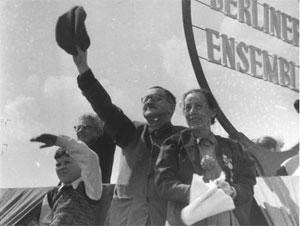Brecht’s musings on American capitalism
Bertolt Brecht and Helene Weigel, 1954 (image: Commons:Bundesarchiv)
The following is not a full transcript; for full story, listen to audio.
“We’re seeing the end of capitalism. The end of capitalism as we know it, and I say good riddance,” says filmmaker Michael Moore speaking last year with CNN’s Larry King. Moore’s upcoming movie has an ironic title, “Capitalism: A Love Story.” But it’s just the latest blast against capitalism.
Decades ago German playwright Bertolt Brecht had his say in the wake of the 1929 Wall Street Crash, Brecht wrote about New York. It’s as if he was writing last year.
Weeks after the crash Brecht put pen to paper and came with this: A poem called “The Late Lamented Fame of the Giant City of New York.” At the start, New Yorkers are on top of the world.
Brecht had never visited his New York when he wrote his poem, but that didn’t stop him from having an opinion about the place. The poem was shaped by Brecht’s admiration for Karl Max. 2009 is plenty different from 1929, but not entirely different according to Robert Cohen, a professor at New York University.
“It is a vision of capitalism that kind of in the waves the way Marx describes it, which has its high moments and then constantly self-destructs, rebuilds itself, and this kind of cyclical vision kind of reveals its logic. If we read the poem today and we see the obvious parallels.”
“For people like Brecht, the collapse in 1929 was a confirmation of suspicions of market capitalism had a destructive power,” says Marc Silberman, who studies the work of Bertolt Brecht at the University of Wisconsin.
For Silberman, Brecht’s doubts about capitalism emerged from a specific time and place, Germany in the 1920s. After the trauma and defeat of the first World War, Germany embarked on a bold experiment in constitutional democracy, the Weimar Republic. But while Germany’s politics were changing, other aspects of life were stagnant.
“Brecht was living a Weimar, Germany that was completely burdened by tradition. Dress codes, cultural values, ideals and so on.”
Young artists like Bertolt Brecht and his composer collaborator Kurt Weill looked elsewhere for inspiration. They looked west.
“For many of the intellectuals, middle-class people who felt constrained, America was a breath of fresh air. The United States seemed like the place where everything was possible.”
Before Brecht came to criticize America, he loved America and the fruits of American capitalism. Brecht devoured American culture, American thought, and he put America — his imagined America — center stage in his writing.
Brecht and Weill’s opera “The Rise and Fall of the City of Mahagonny” is a parable of capitalism. Mahagonny is an imaginary city in Alabama. Coincidentally, the state that Lehman Brothers got its start back in the 19th Century. It’s a city of pleasure. At the start, that’s shown to be a good thing. You can buy anything, everything you want, but as the opera develops, prosperity gives way to savage greed.
In Mahagonny, capitalism is cut-throat. The city is like a net cast out to snare edible birds. But by the end of the opera, the city itself is destroyed. It’s a harsh depiction of capitalism.
But Brecht didn’t see that as the end of things, says scholar Marc Silberman. “This is an intimate part of Brecht’s thinking. I believe that moments of crisis, moments of destruction are also possibilities for developing something new.”
PRI’s “The World” is a one-hour, weekday radio news magazine offering a mix of news, features, interviews, and music from around the globe. “The World” is a co-production of the BBC World Service, PRI and WGBH Boston.
Every day, reporters and producers at The World are hard at work bringing you human-centered news from across the globe. But we can’t do it without you. We need your support to ensure we can continue this work for another year.
Make a gift today, and you’ll help us unlock a matching gift of $67,000!
